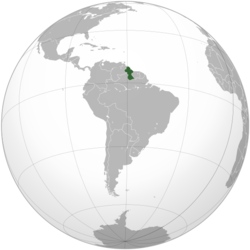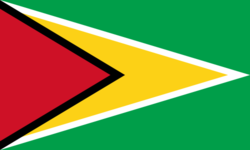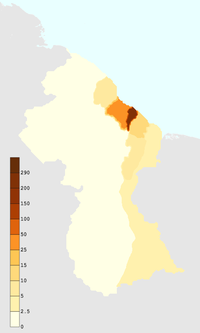Guyana
 | |
 | |
| Location | South America |
| Leader | Guyana/President |
| Type | |
| Member of | Commonwealth of Nations, International Criminal Court, Organisation of American States, UN |
| Subpage | •Guyana/COVID-19 Vaccines Task Force •Guyana/President |
| The only UK colony on the mainland on South America. | |
Guyana is a country on the northern mainland of South America and the capital city is Georgetown. Guyana is bordered by the Atlantic Ocean to the north, Brazil to the south and southwest, Venezuela to the west, and Suriname to the east.
Contents
COVID-19
- Full article: Guyana/COVID-19 Vaccines Task Force
- Full article: Guyana/COVID-19 Vaccines Task Force
Population
The chief majority (about 90%) of Guyana's 744,000 population lives along a narrow coastal strip which ranges from a width of 16 to 64 kilometres (10 to 40 mi) inland and which makes up approximately only 10% of the nation's total land area.[1]
The population of Guyana is racially and ethnically heterogeneous, with ethnic groups originating from India, Africa, Europe, and China, as well as indigenous or aboriginal peoples. Despite their diverse ethnic backgrounds, these groups share two common languages: English and Creole.
The largest ethnic group is the Indo-Guyanese (also known as East Indians), the descendants of indentured laborers from India, who make up 43.5% of the population, according to the 2002 census. They are followed by the Afro-Guyanese, the descendants of slaves from Africa, who constitute 30.2%. The Guyanese of mixed heritage make up 16.7%, while the indigenous peoples (known locally as Amerindians) make up 9.1%. The two largest groups, the Indo-Guyanese and Afro-Guyanese, have experienced some racial tension.[2][3][4]
Regime Change
- Full article: Cheddi Jagan
- Full article: Cheddi Jagan
From 1953-64, the UK and the US went to great lengths to prevent a democratically elected leader of British Guiana/Guyana from governing. Cheddi Jagan had tried to remain neutral and independent and was elected three times. Using a variety of tactics including general strikes and disinformation to "terrorism" and British legalisms, the U.S. and Britain finally forced Jagan out in 1964. John F. Kennedy had given a direct order for his ouster, as, presumably, had Eisenhower.
One of the better-off countries in the region under Jagan, Guyana, by the 1980s, was one of the poorest. Its principal export became people.[5]
Forbes Burnham
After their preferred leader, Afro-Guyanese Forbes Burnham, received power in 1964, conditions in the colony began to stabilize after the regime change effort. The new coalition administration broke diplomatic ties with Cuba and implemented policies that favored the local elite and foreign industry.
On February 23, 1970, Guyana, still under Burnham, swung leftward and declared itself a "cooperative republic" and cut all ties to the British monarchy. The governor general was replaced as head of state by a ceremonial president. Relations with Cuba were improved, and Guyana became a force in the Nonaligned Movement. In August 1972, Burnham hosted the Conference of Foreign Ministers of Nonaligned Countries in Georgetown, where he spoke on imperialism and the need to support African liberation movements in southern Africa. Burnham also let Cuban troops use Guyana as a transit point on their way to the war in Angola in the mid-1970s.
In the early 1970s, electoral fraud became blatant in Guyana. PNC victories always included overseas voters, who consistently and overwhelmingly voted for the ruling party. The police and military intimidated the Indo-Guyanese. The army was accused of tampering with ballot boxes.
Jonestown
- Full article: Jonestown
- Full article: Jonestown
Burnham's control over Guyana began to weaken when the 1978 Jonestown massacre brought unwanted international attention. In the 1970s, Jim Jones, leader of the People's Temple of Christ, moved more than 1,000 of his followers from San Francisco to form Jonestown, a utopian agricultural community near Port Kaituma in western Guyana. The People's Temple of Christ was regarded by members of the Guyanese government as a model agricultural community that shared its vision of settling the hinterland and its view of cooperative socialism. The People's Temple of Christ and Jim Jones have still unclear ties to the CIA.
Brassington family
The powerful Brassington family, old sugar plantation owners, were "rumored, suspected, and finally proven to be involved in international drug trafficking." The family, in control of privatization of state assets, made a huge amount of money "through the simple expedient of treating the country's resources as their own, by selling the country's bauxite to Russian billionaire Oleg Deripaska[6]
According to Daniel Hopsicker, "Michael Francis Brassington is the family's most infamous son, a professional pilot with a sordid criminal career in international drug trafficking. According to DEA affidavits and court testimony, Brassington flew co-pilot on 39 weekly round trips on Wally Hilliard's Learjet in the year 2000 before getting busted. Each time the Learjet flew from Florida to Venezuela and back, before heading north to end at Teterboro Airport outside New York. Wally Hilliard was the owner of the flight school where Mohamed Atta and Marwan Al-Shehhi began learning to fly on July 3, 2000."[7]
Border dispute
- Full article: Guayana Esequiba
- Full article: Guayana Esequiba
Guyana and Venezuela have a long history of debate surrounding their border,[8] an issue that became of geopolitical importance after suspected large oil deposits were discovered.
Event
| Event | Description |
|---|---|
| Jonestown | The People's Temple cult, in Jonestown, lead by Jim Jones. In 1978 hundreds of members were poisoned by drinking a cyanide laced drink. |
Job here
| Event | Job | Appointed | End |
|---|---|---|---|
| Richard Welch | Guyana Chief of Station | 1967 | 1969 |
A citizen of Guyana on Wikispooks
| Title | Description |
|---|---|
| Gerald A. Perreira | Guyanese political activist, educator, writer and commentator, and a committed Pan-Africanist. |
Related Documents
| Title | Type | Publication date | Author(s) | Description |
|---|---|---|---|---|
| Document:British Intervention in British Guiana 1953 | book extract | 12 February 2007 | Mark Curtis | |
| Document:What’s Not Being Said About the Venezuela Oil War | Article | 17 February 2019 | William Engdahl | The Venezuela Oil War Is Really About Huge Oil Reserves in the District of Guayana Esequiba |
References
- ↑ https://web.archive.org/web/20100411064504/http://www.geographia.com/Guyana/geninfo.html
- ↑ "Guyana turns attention to racism Archived 2 December 2010 at the Wayback Machine.". BBC News. 20 September 2005.
- ↑ https://web.archive.org/web/20101202013914/http://www.guyana.org/features/conflicts_indiansandblacks.html
- ↑ https://web.archive.org/web/20120715075007/http://www.ibtimes.com/articles/265657/20111212/guyana-politics-election-blacks-indians-ramotar-ppp.htm
- ↑ A Brief History of U.S. Interventions 1945 to the Present by William Blum - Z magazine, June 1999.
- ↑ https://www.madcowprod.com/2017/03/30/russian-oligarch-oleg-deripaska-me/
- ↑ https://www.madcowprod.com/2013/03/06/source-rudi-dekkers-drug-case-will-never-go-to-trial
- ↑ http://www.country-data.com/cgi-bin/query/r-14587.html
